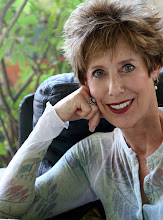I want to share something with you. Something very important. It's concerns our brains. The brain is a very complex organ, composed of approximately 100 billion neurons and each one of those neurons communicates with up to 10.000 other neurons. It's a loaded minefield in our heads.
We have been, and rightly so, very concerned about losing our minds, or more specifically succumbing to memory loss before our time. After all, some of us have seen our parents or grandparents suffer from dementia or early onset of Alzheimer's disease. In my case, I have seen how my ex-husband has had to handle his wife, Diane, who has suffered from Alzheimer's for well over a decade. The disease probably began in her mid-50s. Her mother died from this terrible disease. Diane probably didn't have a chance between her DNA and the lack of a cure.
Presuming at mid-life that we will not have Alzheimer's and may just be part of the hundreds of thousands of elderly people who begin to lose short term memory, like my mother, and then finally lose so much that she cannot remember to eat, there is great interest in how can we manage this process just a little bit better than our parent's generation. There is definitely power in knowing and understanding just a little more about how we learn and retain information.
I have been reading about the brain. It fascinates me because I am preparing to go out as a speaker and talk about the boomer generation. The speaking process is very different form the writing process. When I wrote Sixty, Sex, & Tango, Confessions of a Beatnik Boomer, the memories were active in my head and they were important enough to me to be clearly remembered for decades. The key in writing my memoir was that I had a very strong emotional attachment to the subject.
But if I'm trying to motivate someone as a speaker, trying to get people to change behavior or try new behavior, I need to know how the brain receives and retains and then acts or on the messages. People learn when they apply the concepts given to them with consistently.
Part of the learning equation is how interested we are in the subject. But the way we learn best is when we are given a few related points and build on these points for effect. The denser the points, the more the points are illustrated, the more we will retain. The least effective way we retain information is by just plain memorizing.
Another way we retain information is by picking up on active verbs, which animate ideas. When speakers get us to think about doing what they're talking about, we are learning. But the key is whether what we are learning is meaningful in terms of feelings, which are generate by emotions. That involves the limbic area of the brain - the pain/pressure center. It's the area that turns words into memory. We also learn better through context than content. This means we respond better to what we know through experience. When I hear Buenos Aires, I have an immediate, tactile sense about the city. If one speaks to me about Buenos Aires, I am immediately at attention.
My reading about the brain indicated that the brain is lazy and has to be stimulated or coached into consciousness. However, if the brain understands that what someone is telling them is really good for the person - the "what's in it for me" idea is a powerful listening device.
All that said, now is the moment to ask: How can we stop some of that memory loss? How can we keep our minds from aging? The standard answer is do crossword puzzles. I balk at that because I'm terrible doing them so I feel left out of that loop. I can't dredge up a word to go with a cue unless it's about movies or the theater.
But there are actually three theories that help the brain's retention. The effects of meditation on the brain has been studied at the UCLA brain mapping center. All results point to a connection between meditation and more brain activity. A yoga practice adds longevity to our mind and body since the practice connects the mind and body through the breath. And any kind of exercise, even just walking is a key to longevity. In fact, exercise is number one on the anti-aging list of things to do to stay young.
But I heard something else today pertaining to the brain, which sparked my interest. There is something called adaptive competency - this is the ability of the brain to bounce back from stress. In other words, adaptive competency allows us to move off our anxious state or stress related experience and into a present state where that stress passes through us. My mother had that in spades. I remember when a stressful or unpleasant experience occurred, my mother would say, "Just get over it, dear. Leave it behind you." She never in all the time she was alive "chewed" on the negative. She slept well every night she lived on this earth. This characteristic of the brain is called cognitive reserve.
The way the brain adapts, it's cognitive reserve, or does not adapt - very little cognitive reserve - determines our ability to release stress and, therefore, live longer. A practice of meditation and yoga helps to build up our cognitive reserves.
It might be interesting to examine daily how long we hold on to our stress. Then take a yoga class for the next six months and see how your cognitive reserves have built up.
Namaste
Joan



Namaste
ReplyDelete